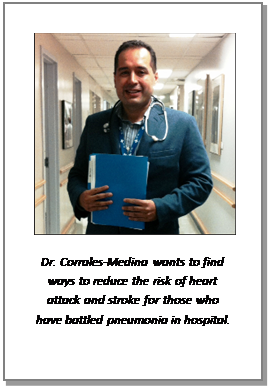
Marion Gallagher can relax a bit, knowing that she has developed a care plan with her family doctor that addresses her increased risk of having a heart attack or stroke — the result of pneumonia that put her in the hospital. (Photo courtesy of CTV Ottawa)
After Marion Gallagher contracted pneumonia and landed in hospital for a week last October, she didn’t know she should consider herself at a greater risk of heart attack or stroke.
In truth, nobody really did, although Dr. Vicente Corrales-Medina and a few others had their suspicions.
Now Dr. Corrales-Medina, a researcher and infectious disease physician at The Ottawa Hospital, has concrete evidence that will start improving life after pneumonia for people like Gallagher.
In a paper published by the Journal of the American Medical Association on Jan. 20, Dr. Corrales-Medina and colleagues from Pittsburgh showed that patients who had been hospitalized for pneumonia were at a significantly higher risk of developing future cardiovascular disease, even if they had never previously suffered a heart attack or stroke (see news release).
Among the findings, the study showed that if people aged 65 and older were admitted to hospital with pneumonia, they were four times more likely to develop cardiovascular disease in the first 30 days following the infection. In the tenth year, they were still nearly twice as likely to develop cardiovascular disease.
 “After someone has been hospitalized for pneumonia, physicians should develop a care plan with the understanding that these patients are more likely to develop cardiovascular disease in the weeks, months and years following their recovery from this infection. Such measures could include screening and primary prevention strategies for cardiovascular disease,” said Dr. Corrales-Medina, who is also an assistant professor with the University of Ottawa’s Faculty of Medicine.
“After someone has been hospitalized for pneumonia, physicians should develop a care plan with the understanding that these patients are more likely to develop cardiovascular disease in the weeks, months and years following their recovery from this infection. Such measures could include screening and primary prevention strategies for cardiovascular disease,” said Dr. Corrales-Medina, who is also an assistant professor with the University of Ottawa’s Faculty of Medicine.
This is something the 89-year-old Gallagher took to heart after hearing the study’s results. She talked with her family physician and now has a care plan that acknowledges her new risk factor.
“I want her to keep close tabs on my heart and all the things that could lead to a stroke or heart attack,” said Gallagher.
In addition, Gallagher volunteered to participate in a research study that Dr. Corrales-Medina is conducting to determine what biological mechanisms are responsible for this raised risk of cardiovascular disease after pneumonia. He wants to develop treatments that could be given to someone like Gallagher in order reduce the elevated risk she is living with now.
Quick facts
- Every year in the United States, 1.2 million people are hospitalized for pneumonia, according to ACP Medicine. (Canadian figures combine pneumonia with influenza.)
- Cardiovascular disease is considered the most common and deadly disease group in Canada and around the world. In 2008, according to Statistics Canada, cardiovascular disease accounted for 29 percent (69,703) of all deaths in Canada. Of those deaths, 54 percent were due to ischemic heart disease (caused by narrowing of the arteries to the heart), 23 percent to heart attack and 20 percent to stroke.
- People over the age of 65 make up about one-third of all cases of community-acquired pneumonia, are hospitalized more often and stay longer in hospital than younger people, according to Baum’s Textbook of Pulmonary Diseases, seventh edition
Research at The Ottawa Hospital involves more than 1,700 scientists, clinician-investigators, graduate students, postdoctoral fellows and staff who are working to improve the understanding, prevention, diagnosis and treatment of human disease. Support our research. Give to the Tender Loving Research campaign.

Support patient care and research at
The Ottawa Hospital


 To reset, hold the Ctrl key, then press 0.
To reset, hold the Ctrl key, then press 0.
Comment on this post